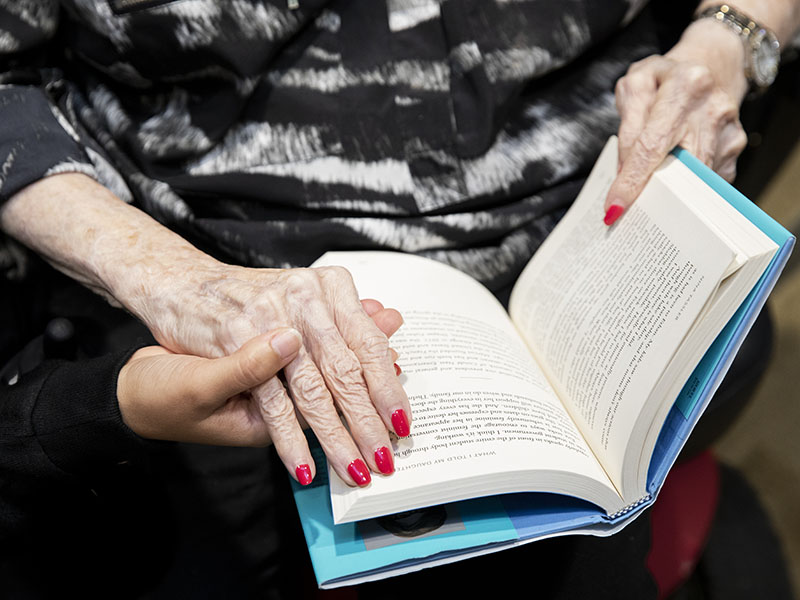Enhancing Care Through Deep Knowing
Mrs. L., a resident at Sarah Neuman, The New Jewish Home’s Westchester campus, was visited regularly by her husband. “He came religiously every day to help walk with her and care for her,” according to Miriam Levi, Assistant Administrator. “So it ripped him apart when we closed our doors in March because of COVID-19.” But, thanks to a person-directed care model, adopted six years ago by The New Jewish Home, Mr. L. was able to maintain frequent contact with his wife during the pandemic even though he couldn’t visit like he used to. “The staff worked out a way he could come to a fence in the garden and see her, and he could call every day and be comforted by the fact that he was talking to someone who really knows his wife — her habits, likes and dislikes. That’s a big plus for residents and families.”
Inspired by the Green House® Project — a non-profit that builds small, home-like skilled nursing communities — the care model is built around three tenets: creating a real home for residents; empowering staff and training them in “deep knowing” of the seniors they care for while building a meaningful life for everyone in the home. “At Sarah Neuman,” Levi explains, “we operate Small Houses where seniors live in intimate groups of 13 with dedicated staff to care for them. That allows us to easily replicate the “real home” feeling. For example, knowing that someone likes to sleep with the light on or prefers certain foods or wants their bed made a certain way … It’s all about making our seniors feel they are deeply known and loved, just like in their own homes.”
Making it all work day to day is an empowered staff of caregivers who receive intensive training in the philosophy and practices of “deep knowing”. These caregivers, numbering about 30, are called adirim — a Hebrew word that means noble and majestic. Meet adir Elaine Ellis, who has been at the Westchester campus for 31 years. Having worked in a more traditional nursing home setting for many years, she is enthusiastic about the Green House model of care: “It’s more intimate. You have more of a rapport with the residents you care for. You can spend more time with them.”
Instead of rotating shifts as in a traditional nursing home, the adirim work as a team, setting their own schedules and covering all shifts themselves, so there is always staff in the house who knows the residents intimately. “Residents and adirim become like a family,” says Levi. As an example, Ellis describes how, in the cozy and modern Small House setting, residents might sit in the wood-paneled den relaxing by a fireplace next to the open-style kitchen as she prepares a meal. “They can smell and see the food cooking and participate if they’d like. We get to talk and have fun with them.”
When the pandemic began, “deep knowing” was more crucial than ever, particularly for residents with dementia who could not always articulate their needs. Ellis explains: “Someone might not be showing symptoms — a fever, say — but working with them day-to-day you could see a difference, and even when they couldn’t tell us what they were feeling, we could say to the supervisor ‘I think Ms. L is coming down with something.’ ”
If patients got sick and had to be moved to a different unit during COVID-19, they continued to receive the individualized care that is the hallmark of the model. “The adirim still cooked the food they liked and sent it over,” says Levi. “This kind of individualized care meant the world to family members, like Mr. L., who even when they could not come and visit, knew their loved ones were being well cared for. These are deep relationships; they felt very connected. It was beautiful.”
The New Jewish Home has a proud legacy of empowering older adults to live with purpose and enhanced well-being. We’ve been around since 1848 as one of the nation’s first nursing homes, and now serving older New Yorkers of all backgrounds through a portfolio of health care services, including post-acute care and rehabilitation, skilled nursing, adult day care, assisted living, and at-home care.
See how we continue to elevate health care for older adults through our Research Institute on Aging and our SkillSpring program (formerly known as Geriatrics Career Development program), which empower teens and young adults to begin careers in health care.

